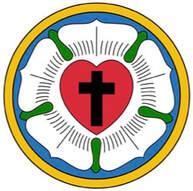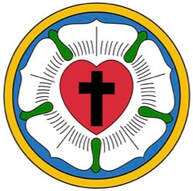 Having received Absolution, the congregation moves from the time of preparation to that part of the Divine Service known as “the service of the Word.” We typically begin the service of the Word with an introit or Psalm. The word “introit” means “entrance” or “beginning.” As Christians moved from a persecuted minority to the official majority, they also moved from having worship in someone’s home to larger basilicas. This provided the opportunity to adorn the service with liturgical details that would not have been possible in a cramped home church. Luther Reed writes, “In the early fifth century, Pope Celestine I (died 432) decreed that an entire Psalm should be sung antiphonally (back and forth) by a double choir as the clergy came from the sacristy (at the back of the church) to the altar. This was intended to add solemnity to the entrance of the clergy and to establish the thought or mood appropriate for the particular service.” Essentially, the introit was travel music as the clergy moved from one place to another.
Today the use of the introit is a little different. As stated above, it comes after the absolution to begin the service of the Word rather than beginning the entire worship service as it did in Pope Celestine’s time. The introit is part of the propers of the day. That means it changes from Sunday to Sunday. The introit is typically not a whole psalm but a part of a psalm that contains the insertion of a repeated verse called an “antiphon.” The antiphon will help set the theme for the day. The antiphon begins and ends the introit. An introit, Psalm or hymn is appropriate after the absolution. Having been forgiven, it’s natural to sing to the Lord as we come into His presence with thanksgiving. The pastor may show this in a visual way by literally “entering” into the chancel during this part of the Liturgy. Prior to this point of the service, he may have been outside of the communion rails as a part of the congregation. Now, he may enter into the chancel which is the Christian version of the Holy of Holies. A Psalm or introit is often used because the book of Psalms has been the prayer and hymn book of the church since Old Testament times, and it is a way in which the saints of all ages are joined together in worshipping the one true God. The Gloria Patri, or Glory be to the Father, ends the introit or Psalm to proclaim beyond a shadow of a doubt to anyone present that we are addressing the Triune God in His own words that may be chanted to show how special they are. (Adapted from https:// steadfastlutherans.org/2008/10/ notes-on-the-liturgy-2/) Comments are closed.
|

